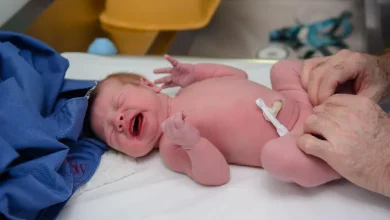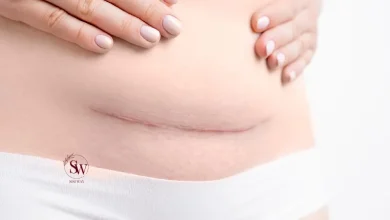How to Stop Hair Loss?
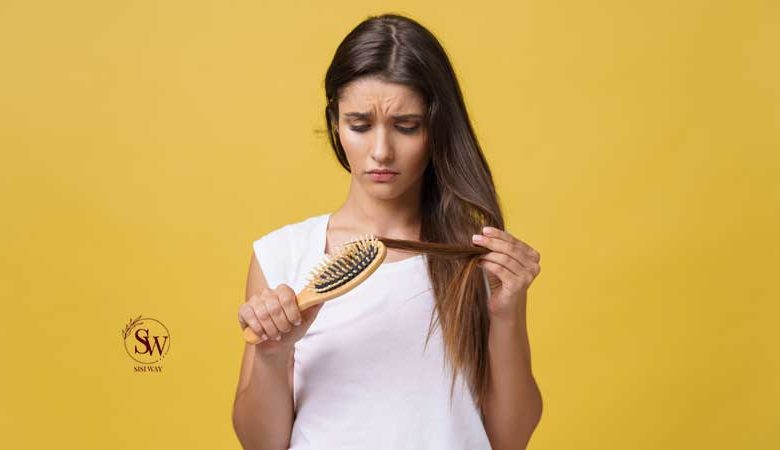
Hair loss is a common concern for people of all ages and genders, impacting not just physical appearance but also self-esteem. In this comprehensive guide, we will explore the various aspects of hair loss, from its causes to potential solutions. By delving into the science behind hair loss, understanding vitamin deficiencies, and exploring lifestyle factors, we aim to provide you with valuable insights on how to stop hair loss.
What Causes Hair Loss?
Hair loss can result from a variety of factors, ranging from genetic predisposition to environmental influences. Understanding the root causes is crucial for developing effective prevention and treatment strategies.
- Genetics: Family history plays a significant role in determining whether you are prone to hair loss. If close relatives have experienced it, there’s a higher likelihood you may too.
- Hormonal Changes: Fluctuations in hormone levels, such as during pregnancy, menopause, or conditions like polycystic ovary syndrome (PCOS), can contribute to hair loss.
- Medical Conditions: Certain medical conditions, such as alopecia areata, thyroid disorders, and autoimmune diseases, can lead to hair loss.
- Medications and Treatments: Some medications, like chemotherapy drugs, as well as certain treatments like radiation therapy, may result in hair loss as a side effect.
- Nutritional Deficiencies: Lack of essential vitamins and minerals, especially vitamin D, iron, and zinc, can contribute to hair loss.
Which Vitamin Deficiency Causes Hair Loss?
Vitamin deficiency can indeed play a significant role in hair loss. Among the essential vitamins, three are particularly crucial for maintaining healthy hair:
- Vitamin D: A deficiency in vitamin D has been linked to hair loss. Ensure you receive adequate sunlight exposure or consider supplements to maintain optimal levels.
- Iron: Iron deficiency, often associated with anemia, can lead to hair thinning and loss. Consuming iron-rich foods or supplements can help address this deficiency.
- Zinc: Insufficient zinc levels have been linked to hair loss. Including zinc-rich foods in your diet or taking supplements under medical guidance may prove beneficial.
How to Stop Hair Loss?
Addressing hair loss requires a multi-faceted approach, combining lifestyle changes, proper nutrition, and targeted treatments:
- Maintain a Balanced Diet: Ensure your diet includes a variety of nutrients, with a focus on vitamins and minerals crucial for hair health. Incorporate fruits, vegetables, lean proteins, and whole grains into your meals.
- Use Gentle Hair Care Products: Harsh chemicals in hair care products can damage your hair and contribute to hair loss. Opt for sulfate-free shampoos and conditioners that promote scalp health.
- Manage Stress: Chronic stress can contribute to hair loss. Practice stress-reducing techniques such as meditation, yoga, or deep breathing exercises.
- Seek Professional Advice: Consult with a dermatologist or a trichologist to identify the specific cause of your hair loss. They can recommend personalized treatment options, including medications or topical solutions.
Best Diet for Preventing Hair Loss

Maintaining a balanced and nutrient-rich diet is essential for overall health, and it can significantly impact the health of your hair. A deficiency in certain vitamins and minerals can contribute to hair loss, so incorporating the right nutrients into your diet is crucial. Here’s a closer look at the best diet for preventing hair loss:
1. Protein-Rich Foods:
Protein is a fundamental building block for hair, and insufficient protein intake can lead to hair thinning and loss. Include lean sources of protein such as poultry, fish, eggs, beans, and nuts in your diet.
2. Iron and Ferritin:
Iron is vital for the production of hemoglobin, which carries oxygen to the body’s cells, including hair follicles. Foods rich in iron, such as red meat, poultry, lentils, and leafy greens, can help prevent iron deficiency-related hair loss.
3. Omega-3 Fatty Acids:
Omega-3 fatty acids support scalp health and can be found in fatty fish like salmon, mackerel, chia seeds, and flaxseeds. These essential fats contribute to the overall strength and shine of your hair.
4. Vitamin A and Beta-Carotene:
Vitamin A plays a crucial role in promoting the production of sebum, which helps keep the scalp moisturized. Foods rich in vitamin A include sweet potatoes, carrots, spinach, and kale.
5. Vitamin E:
Vitamin E is an antioxidant that helps combat oxidative stress, which can contribute to hair loss. Incorporate nuts, seeds, spinach, and avocados into your diet to boost your vitamin E intake.
6. B Vitamins:
B vitamins, especially Biotin (B7), are known for their role in hair health. Whole grains, eggs, nuts, and leafy greens are excellent sources of B vitamins that support hair growth.
7. Zinc:
Zinc is essential for maintaining the health of hair follicles, and a deficiency can contribute to hair loss. Include zinc-rich foods like oysters, beef, pumpkin seeds, and lentils in your diet.
8. Hydration:
Staying well-hydrated is crucial for overall health, including the health of your hair. Aim to drink an adequate amount of water daily to keep your hair and scalp hydrated.
9. Avoid Excessive Vitamin A:
While vitamin A is essential, excessive intake can have adverse effects on hair health. Ensure you are within the recommended daily intake limits and consult with a healthcare professional if needed.
Also Read: Women’s Diet for Abs
Does Creatine Cause Hair Loss?
There is limited scientific evidence linking creatine supplementation directly to hair loss. While some anecdotal reports suggest a potential association, more research is needed to establish a conclusive link between creatine and hair loss. If you have concerns, consulting with a healthcare professional before starting any supplementation is advisable.
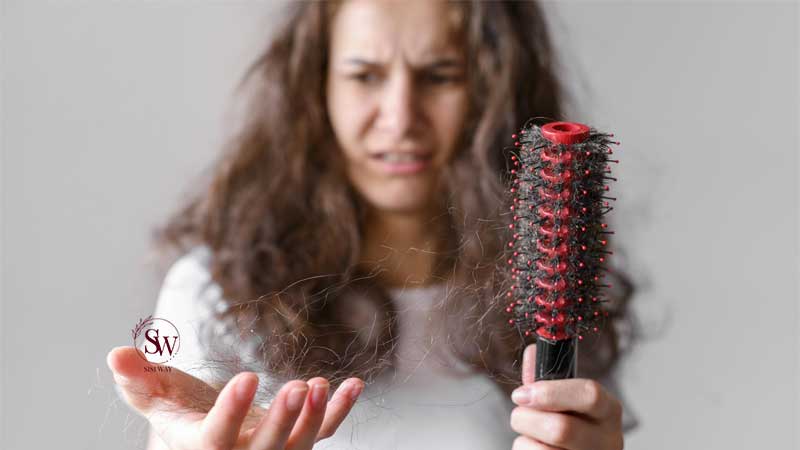
How Much Hair Loss Is Normal?
It’s normal to lose some hair daily as part of the natural hair growth cycle. On average, individuals lose 50 to 100 hairs per day. If you notice excessive shedding or bald patches, it may indicate an underlying issue, and seeking professional advice is recommended.
Will Wearing Caps with Long Hair Cause Hair Loss?
Wearing caps, especially if too tight, for extended periods may contribute to hair loss by causing friction and tension on the hair shafts. However, this is more likely to result in breakage rather than permanent hair loss. To minimize the risk, choose loose-fitting caps and avoid wearing them continuously.
Can Dandruff Cause Hair Loss?
While mild dandruff is usually not a direct cause of hair loss, severe and chronic dandruff conditions may contribute to hair thinning. Persistent inflammation of the scalp can weaken hair follicles. Proper dandruff management with medicated shampoos and maintaining good scalp hygiene can help prevent associated hair loss.
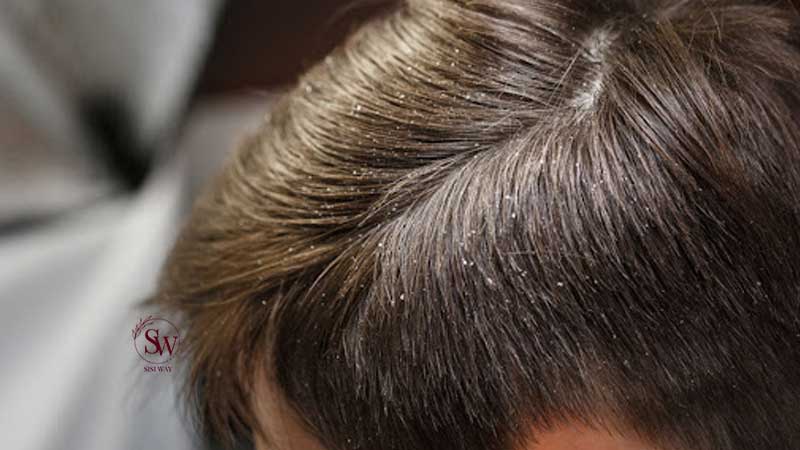
Can Stress Cause Hair Loss?
Yes, chronic stress can contribute to hair loss through a condition called telogen effluvium. This stress-induced hair shedding is usually temporary, and the hair typically regrows once the stress is addressed. Managing stress through relaxation techniques and self-care is crucial for maintaining overall health, including the health of your hair.
Can Hair Loss Be a Sign of Something Serious?
In some cases, hair loss can be a symptom of underlying health issues such as thyroid disorders, autoimmune diseases, or nutritional deficiencies. If you are experiencing significant hair loss or notice sudden changes, it’s essential to consult with a healthcare professional to rule out any serious underlying conditions.
Frequently Asked Questions about Hair Loss:
- Are there any natural remedies for hair loss?
While some natural remedies may help improve hair health, such as coconut oil or aloe vera, their effectiveness varies, and scientific evidence is limited. - Can smoking contribute to hair loss?
Smoking has been linked to premature aging and may indirectly contribute to hair loss. Quitting smoking can have numerous health benefits, including potential improvements in hair health. - Is hair loss more common in men than women?
Hair loss is more commonly associated with men, but women can also experience it due to various factors such as hormonal changes, genetics, and medical conditions.
Conclusion
Addressing and preventing hair loss involves understanding its causes, maintaining a healthy lifestyle, and seeking professional advice when needed. By incorporating these strategies into your routine, you can take proactive steps to promote hair health and potentially mitigate or even stop hair loss. Remember, individual responses to treatments may vary, and it’s crucial to consult with healthcare professionals for personalized guidance.

